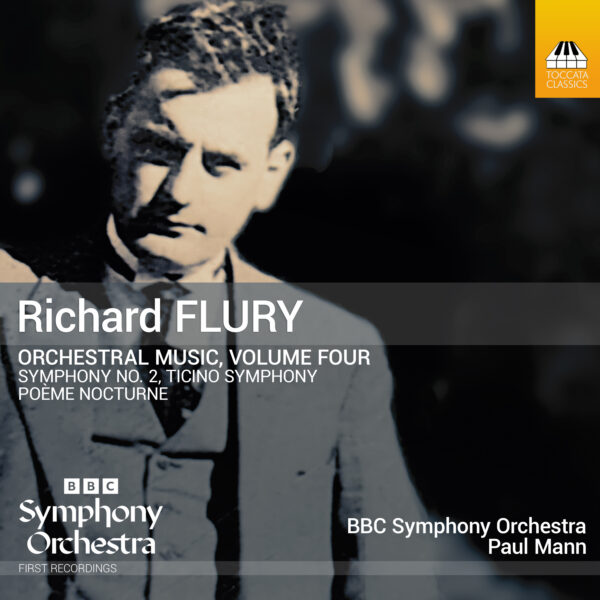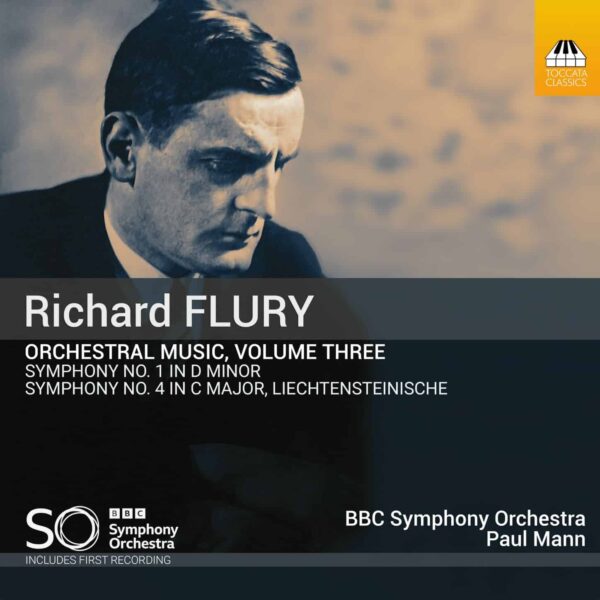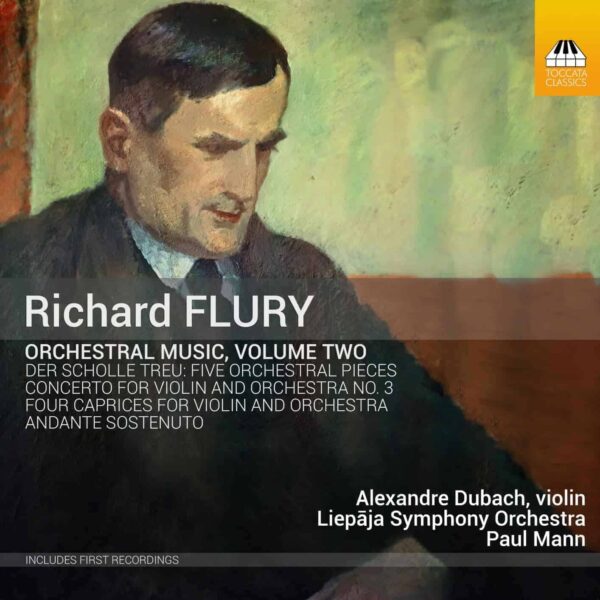Richard Flury: Orchestral Music, Volume Four
The Second Symphony of the Swiss composer Richard Flury (1896–1967) is deeply bound up with his personal life. In 1932 his first marriage broke up, and his wife and four children left Solothurn in the north to settle in Ticino, in the south. Through visits to his family in Lugano Flury grew to know the area well, so much so that he decided to celebrate their new surroundings in his Second Symphony, the movements of which are based on the carillon of the Flury family’s local church and three Ticino folksongs. Structurally, the work belongs to the Brucknerian tradition, but it also has points of contact with the orchestral naturepainting of Flury’s good friend Joseph Marx. The landscape of the Poème nocturne is an interior one: it is an expansive dreamfantasy of occasionally violent passions, a worthy cousin of Richard Strauss’ tonepoems.
BBC Symphony Orchestra
Paul Mann, conductor
Listen To This Recording:
Symphony No. 2 “Ticino Symphony” (1936) (48:27)
- I. Allegro (13:07)
- II. Andante (12:33)
- III. Scherzo. Allegro molto (8:26)
- IV. Finale. Allegro (14:21)
- Poème nocturne (1939) (18:01)
First Recordings



MusicWeb International :
‘Where would we be without companies such as Toccata who are regularly responsible for recording the works of neglected composers? Much poorer is the answer, and this is yet another in their series of CD’s presenting compositions by Richard Flury, who has been largely overlooked outside his native Swiss canton. The CD booklet, printed in both English and German, provides detailed insights into the works, featuring extensive quotations from contemporary critics. The recording is rich and dynamic, and despite their probable unfamiliarity with the piece, the BBC Symphony performs it with enthusiasm and energy, doubtless inspired by conductor Paul Mann.’
—Jim Westhead, MusicWeb International
Online Merker :
‘Wer Richard Flury hört, begegnet einem Komponisten, der in keiner Musikgeschichte zwischen den Großen genannt wird – und doch alles hatte, was große Musik ausmacht: Gespür für Farbe, Sinn für Form, Leidenschaft im Ausdruck. […]
Mit der vierten Folge der Reihe Richard Flury – Orchestral Works setzt das Label Toccata Classics sein verdienstvolles Editionsprojekt fort und bringt zwei Werke zur Geltung, die unterschiedlicher kaum sein könnten – und dabei umso deutlicher machen, wie weit Flurys Ausdrucksspektrum reichte. […]
Das BBC Symphony Orchestra unter Paul Mann findet hier zu einer wunderbar atmenden Interpretation, die sich Zeit lässt für Details, ohne den großen Atem zu verlieren. […]
The “Poème nocturne” strikes a completely different chord – a unique piece that rightly bears its name: not a landscape of Ticino, but one of the soul. Lost in dreams, shadowy, occasionally eruptive – a psychological tone painting that is vaguely reminiscent of Richard Strauss’s symphonic poems, but at the same time knows a typical Swiss moderation that never gets lost in a noisy pose. Here, too, Paul Mann shows a sure hand for dramaturgy and colour balance: he unfolds the inner arcs of tension with patience, the BBC Symphony Orchestra shines with cultivated sound culture, chiseling even secondary voices with nobility and a sense of Flury’s fine textures.
Die Tontechnik von Toccata Classics trägt ihr Übriges bei: weiträumig, warm und voll, ohne übertriebene Effekte. Die dynamische Spannweite bleibt erhalten, selbst im zartesten Pianissimo verliert sich kein Detail.
Diese CD ist mehr als eine Wiederentdeckung. Sie ist ein leiser Triumph der Kontinuität, des Beharrens auf Ausdruckskraft jenseits modischer Strömungen. Richard Flury erweist sich als Komponist, der die Seele seiner Heimat – und seiner selbst – in Musik gegossen hat. Und wer genau hinhört, wird belohnt mit einer klanglichen Welt, die reich ist, berührend und in jedem Takt authentisch.’
—Dirk Schauß, Online Merker
Fanfare :
‘The performances are solid and appear to make a good case for the music. The BBC Symphony plays well […]. I found the sound very good, and the booklet note, by the composer’s son, is informative and includes lengthy excerpts from contemporary newspaper reviews. If you are a fan of late Romantic orchestral music, you will undoubtedly enjoy this.’
—Michael Vaillancourt, Fanfare
Concerto.net :
‘Pour autant, [Tessinoise] ne peut guère être qualifiée de naïvement folklorique : dans une esthétique postromantique opulente jusque dans ses proportions (près de 50 minutes), parfois maladroite mais toujours sincère, elle déroule un propos généreux et confortable, qui bénéficie de la direction convaincue de Paul Mann (né en 1965) et des qualités coutumières de l’Orchestre symphonique de la BBC. Le Poème nocturne (1939) – son titre original est bien en français – exploite durant près de 20 minutes une veine à la fois plus onirique et straussienne, avec une succession d’états de semi‑conscience et de visions hautes en couleur, jusqu’à la bacchanale et à l’orgie.’
—Concerto.net
American Record Guide :
‘Both works on this disc are richly detailed and ably scored. Their language also reflects Bruckner and Franz Schmidt. It’s some of the best orchestral work I’ve heard from Flury.
The performances are vigorous and sonorously recorded. Mann’s readings move the music along with no loss of eloquence.’
—Don O’Connor, American Record Guide, July 2025
Classical Lost and Found :
‘The performances are by the BBC Symphony Orchestra (BBC SO) under British conductor Paul Mann (b. 1965). They were based on new versions of these selections commissioned from Maestro Mann by the Ricard Flury Foundation. He’s previously recorded a number of this composer’s works for Toccata and makes a strong case for the ones here.
All three recordings were made 25-28 September 2023 at the BBC’s capacious Maida Vale MV1 Studio in London. They deliver consistently good sonic images of this music in pleasant surroundings and faithfully capture Flury’s consummate scoring.’
—Robert E. McQuiston, Classical Lost and Found